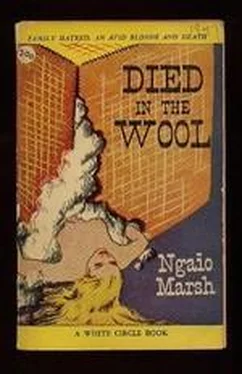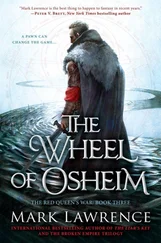Ngaio Marsh - Died in the Wool
Здесь есть возможность читать онлайн «Ngaio Marsh - Died in the Wool» — ознакомительный отрывок электронной книги совершенно бесплатно, а после прочтения отрывка купить полную версию. В некоторых случаях можно слушать аудио, скачать через торрент в формате fb2 и присутствует краткое содержание. Жанр: Классический детектив, на английском языке. Описание произведения, (предисловие) а так же отзывы посетителей доступны на портале библиотеки ЛибКат.
- Название:Died in the Wool
- Автор:
- Жанр:
- Год:неизвестен
- ISBN:нет данных
- Рейтинг книги:4 / 5. Голосов: 1
-
Избранное:Добавить в избранное
- Отзывы:
-
Ваша оценка:
- 80
- 1
- 2
- 3
- 4
- 5
Died in the Wool: краткое содержание, описание и аннотация
Предлагаем к чтению аннотацию, описание, краткое содержание или предисловие (зависит от того, что написал сам автор книги «Died in the Wool»). Если вы не нашли необходимую информацию о книге — напишите в комментариях, мы постараемся отыскать её.
Died in the Wool — читать онлайн ознакомительный отрывок
Ниже представлен текст книги, разбитый по страницам. Система сохранения места последней прочитанной страницы, позволяет с удобством читать онлайн бесплатно книгу «Died in the Wool», без необходимости каждый раз заново искать на чём Вы остановились. Поставьте закладку, и сможете в любой момент перейти на страницу, на которой закончили чтение.
Интервал:
Закладка:
“Don’t you talk silly,” Markins admonished him and added hurriedly: “Beg pardon, sir, I’m sure.”
“It’s absolutely mediaeval,” Cliff mumbled.
“Now, see here,” Alleyn said. “I heartily agree that you and I have had more than enough of these interviews. In the course of them you have refused to give me certain information. I have now got that information from another source. I am going to repeat it to you and ask for your confirmation or denial. You’re in a difficult position. Indeed it is my duty to tell you that what you say will be taken down and may be used in evidence against you.”
Cliff wetted his lips. “But that’s what they say when — that means—”
“It means that you’ll be well advised either to tell the truth or to say nothing at all.”
“I didn’t kill her. I didn’t touch her.”
“Let us start with this business of the whisky. Is it true that you caught Albert Black in the act of stealing it and were yourself in the act of replacing it when Markins found you?”
Markins had moved behind Cliff to the desk. He sat at it, opened his pocket-book and produced a stump of pencil from his waistcoat.
“Anything to say about that?” Alleyn asked Cliff. “True or untrue?”
“Did he tell you?”
Alleyn raised an eyebrow. “I extracted it from his general manner. He admitted it. Why did you refuse to give this story to Mrs. Rubrick?”
“He wouldn’t hand it over until I promised. He’d have got the sack and might have got jailed. A year before, one of the chaps on the place pinched some liquor. They searched his room and found it. She got the police on to him and he did a week in jail. Albie was a bit tight when he took it. I told him he was crazy.”
“I see.”
“I told you it hadn’t anything to do with the case,” Cliff muttered.
“But hasn’t it? We’ll go on to the following night, the night Mrs. Rubrick was murdered, the night when you, dog-tired after your sixteen-mile tramp, were supposed to have played difficult music very well for an hour on a wreck of a piano.”
“They all heard me,” Cliff cried out. “I can show you the music.”
“What happened to that week’s instalment of the published radio programs?”
As Cliff’s agitation mounted, he seemed to grow younger. His eyes widened and his lips trembled like a small boy’s.
“Did you burn it?” Alleyn asked.
Cliff did not answer.
“You knew, of course, that a Chopin ‘Polonaise’ was to be broadcast, followed by the ‘Art of Fugue.’ You had started to work at the Bach and perhaps, while you waited for the program to begin at eight-five p.m., played the opening passages. You saw him playing, Markins, didn’t you?”
“Yes sir,” said Markinns, still writing. Cliff started violently at the sound of his voice.
“But at eight-five you stopped and turned up the radio, which was probably already tuned to the station you wanted. From then, until just before your mother came, when you began to play again, the radio didn’t stop. But at some time during that fifty minutes you went to the wool-shed. It was almost dark when you came out. Albert Black saw you. He was drunk, but he remembered and when, three weeks later, Mrs. Rubrick’s body was found, and the police inquiry began, he used his knowledge for blackmail. He was afraid that when the whisky incident came to light, you would speak the truth. He drove a bargain with you. Now. Why did you go down to the wool-shed?”
“I didn’t touch her. I didn’t plan anything. I didn’t know she was going to the shed. It just happened.”
“You sat in the annex with the door open. If, after you stopped playing and the radio took up the theme, you sat on the piano chair, you would be able to see down the track. You would be able to see Mrs. Rubrick come through the gate at the end of the lavender path and walk up the track towards you. You’d see her turn off to the wool-shed and then she would disappear. I don’t for a moment suggest that you expected to see her. You couldn’t possibly do so. I merely suggest that you did see her. The door was open, otherwise they would not have been able to hear the Bach from the tennis lawn. Why did you leave the ‘Art of Fugue’ and follow her to the wool-shed?”
Watching Cliff, Alleyn thought: “When people are afraid, how little their faces express. They become wooden, dead almost. There’s only a change of colour and a kind of stiffness in the mouth.”
“Is there to be an answer?” he asked.
“I am innocent,” said Cliff, and this gracious phrase came strangely from his lips.
“If that’s true, wouldn’t it be wise to tell me the facts? Do you want the murderer to be found?”
“I haven’t got the hunter’s nose,” said Cliff harshly.
“At least, if you’re innocent, you want to clear yourself.”
“How can I? How can I clear myself when there’s only me to say what happened! She’s dead, isn’t she?” His voice rose shrilly. “And even if the dead could talk, she might still bear witness against me. If she had a moment to think, to realize she’d been hit, she may have thought it was me that did it. That may have been the last thought that flashed up in her mind before she died — that I was killing her.”
As if drawn by an intolerable restlessness, he moved aimlessly about the room, blundering short-sightedly against chairs. “That’s a pretty ghastly idea to get into your head, isn’t it? Isn’t it!” he demanded, his back to Alleyn.
“Then she was alive when you went into the shed? Did you speak to her?”
Cliff turned on him. “Alive? You must be crazy. Alive! Would I feel like this if I’d been able to speak to her?” His hands were closed on the back of a chair and he took in a shuddering breath. “Now,” Alleyn thought, “it’s coming.”
“Wouldn’t it have been different,” Cliff said rapidly, “if I could have told her I was sorry, and tried to make her believe I wasn’t a thief? That’s what I wanted to do. I didn’t know she was going to the shed. How could I? I just wanted to hear the Bach. I started off thinking I might try playing in unison with the radio, but it didn’t work, so I stopped and listened. Then I saw her come up the track and turn off to the shed. I wanted, suddenly, to tell her I was sorry. I sat by the radio for a long time listening and thinking about what I could say to her. I couldn’t make up my mind to go. Then, almost without properly willing it, I got up and walked out, leaving the music still going. I went down the hill, turning the phrases over in my mind. And then… to go in — into the dark — expecting to find her there and… I actually called out to her, you know. I wondered what she could be doing, standing so quiet somewhere in the dark. I could hear the music quite clearly. I called out: ‘Mrs. Rubrick, are you there?’ and my voice cracked. It hadn’t broken properly then, and it cracked and sounded rotten. I walked on, deeper into the shadow.”
He rubbed his face with a shaking hand.
“Yes?” Alleyn said. “You went on?”
“There was a heap of empty bales beyond the press. I was quite close to it by then. It was so queer, her not being there. I don’t know what I thought about. I don’t know really, if I’d any sort of idea about what was coming, but it seems to me now that I had got a kind of intuition. Like one of those nightmares, when something’s waiting for you and you have to go on to meet it. But I don’t know. That may not be true. It may not have happened till my foot touched hers.”
“Under the empty bales?”
“Yes, yes. Between the press and the wall. They were heaped up. I think I wondered what they were doing there. I suppose it was that. And then, in the dark, I stumbled into them. It’s very queer, but I knew at once that it was Mrs. Rubrick and that she was dead.”
Читать дальшеИнтервал:
Закладка:
Похожие книги на «Died in the Wool»
Представляем Вашему вниманию похожие книги на «Died in the Wool» списком для выбора. Мы отобрали схожую по названию и смыслу литературу в надежде предоставить читателям больше вариантов отыскать новые, интересные, ещё непрочитанные произведения.
Обсуждение, отзывы о книге «Died in the Wool» и просто собственные мнения читателей. Оставьте ваши комментарии, напишите, что Вы думаете о произведении, его смысле или главных героях. Укажите что конкретно понравилось, а что нет, и почему Вы так считаете.










